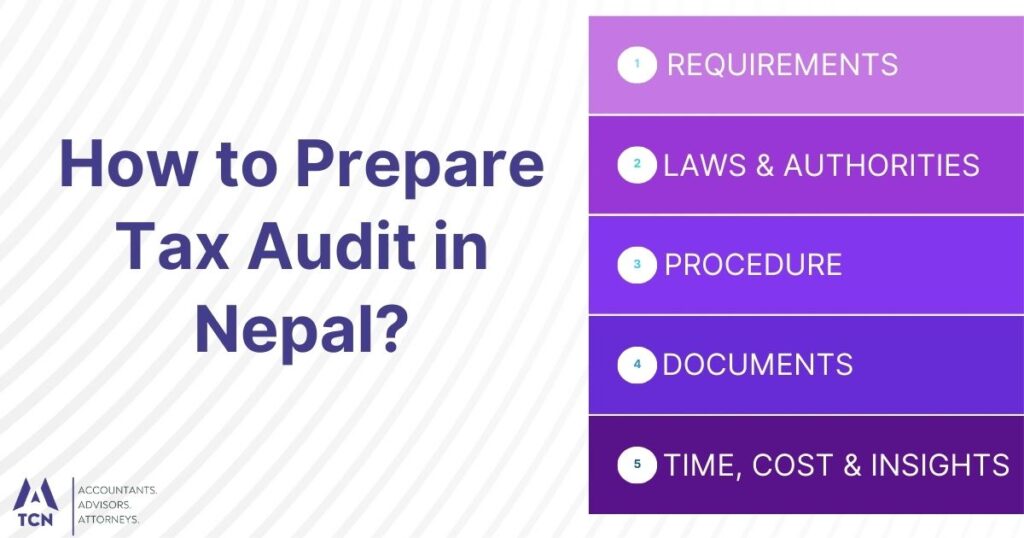Tax audits can be stressful, but with proper preparation, you can navigate the process smoothly. This guide will walk you through the essential steps to prepare for a tax audit, ensuring you’re ready to face the Nepal Inland Revenue Department with confidence.
Essential Documents for a Tax Audit
When facing a tax audit, having the right documents at hand is crucial. Here’s what you’ll need:
- Tax returns for the years under audit
- Bank statements and canceled checks
- Credit card statements
- Receipts for expenses and deductions claimed
- Income documents (W-2s, 1099s, etc.)
- Investment records
- Business financial statements (if applicable)
Keep these documents organized and easily accessible to streamline the audit process.
Organizing Financial Records for an Audit
Proper organization of your financial records is key to a smooth audit. Follow these steps:
- Sort documents by tax year
- Create separate folders for income, expenses, and deductions
- Label each folder clearly
- Use a consistent filing system for both paper and digital records
- Keep a master list of all documents provided to the auditor
- Consider using a document management software for digital organization
- Maintain a backup of all records in a secure location
A well-organized system will save time and reduce stress during the audit.
Common Red Flags in Tax Audits
Understanding what triggers a tax audit can help you avoid potential issues. Some common red flags include:
- Unusually high deductions relative to income
- Inconsistent reporting of income
- Large cash transactions
- Home office deductions
- Excessive business travel or entertainment expenses
- Reporting losses for multiple years
- Significant changes in income or deductions from previous years
Being aware of these triggers can help you ensure your tax returns are accurate and less likely to raise suspicion.
Duration of a Tax Audit
The length of a tax audit can vary depending on several factors:
- Complexity of your tax return
- Type of audit (correspondence, office, or field audit)
- Availability of required documents
- Cooperation level of the taxpayer
- Workload of the auditor
On average, a simple correspondence audit might take 3-6 months, while a complex field audit could last a year or more. Prompt responses and thorough preparation can help expedite the process.
Relevant Articles:
- How to Renew Your Company in Nepal
- PAN Registration in Nepal
- Steps to Register a New Business in Nepal
The Tax Audit Process
Understanding the audit process can help you navigate it more effectively. Here’s a step-by-step overview:
- Notification: You’ll receive an official letter from the Nepal Inland Revenue Department informing you of the audit.
- Initial review: Gather all relevant documents and review your tax returns for the years in question.
- Preparation: Organize your records and prepare explanations for any potential discrepancies.
- Meeting or correspondence: Depending on the audit type, you’ll either meet with an auditor or correspond via mail.
- Document examination: The auditor will review your financial records and may request additional information.
- Follow-up: Respond promptly to any requests for clarification or additional documents.
- Audit findings: The auditor will present their findings, which may result in no changes, a tax refund, or additional taxes owed.
- Response: You can agree with the findings or appeal if you disagree.
- Resolution: Pay any additional taxes or receive your refund, if applicable.
Throughout this process, maintain open communication with the auditor and consider seeking professional assistance if needed.
Responding to Tax Audit Notifications
When you receive a tax audit notification, take these steps:
- Don’t panic – an audit doesn’t necessarily mean you’ve done something wrong
- Read the notice carefully to understand what’s being audited
- Note important dates and deadlines mentioned in the letter
- Contact the auditor if you need clarification on any points
- Begin gathering the requested documents immediately
- Consider seeking professional help from a tax advisor or accountant
- Respond promptly to all communications from the tax authority
Timely and professional responses can set a positive tone for the audit process.
Taxpayer Rights During an Audit
As a taxpayer in Nepal, you have certain rights during an audit:
- Right to professional and courteous treatment by tax officials
- Right to confidentiality and privacy protection
- Right to know why the Nepal Inland Revenue Department is asking for information
- Right to representation by an authorized representative
- Right to appeal disagreements
- Right to pay only the correct amount of tax
- Right to clear explanations of audit findings
Understanding and asserting these rights can help ensure a fair audit process.
Preparing Explanations for Unusual Transactions
If your tax return includes unusual transactions, be prepared to explain them:
- Gather all relevant documentation related to the transaction
- Write a clear, concise explanation of the transaction’s purpose
- Provide context for why the transaction was necessary or beneficial
- Include any supporting evidence or third-party documentation
- Be honest and transparent – don’t try to hide or misrepresent information
- Prepare answers to potential follow-up questions
- Consider having a tax professional review your explanation
Clear, well-documented explanations can help resolve auditor concerns quickly.
Software Tools for Tax Audit Preparation
Several software tools can assist in preparing for a tax audit:
- QuickBooks: For organizing financial records and generating reports
- TurboTax: Helps in preparing and reviewing tax returns
- Expensify: Useful for tracking and categorizing expenses
- Dropbox or Google Drive: For secure digital storage of documents
- Evernote: Helps in organizing notes and receipts
- Wave: Free accounting software for small businesses
- Xero: Cloud-based accounting software with audit trail features
These tools can streamline your record-keeping and make audit preparation more efficient.
Handling Discrepancies Found During the Audit
If the auditor identifies discrepancies, follow these steps:
- Stay calm and professional
- Listen carefully to the auditor’s explanation
- Ask for clarification if you don’t understand the issue
- Review the discrepancy thoroughly before responding
- Provide additional documentation if available
- Explain any extenuating circumstances
- If you agree with the finding, discuss payment options
Remember, you have the right to appeal if you disagree with the audit findings. Consider seeking professional advice before deciding on your next steps.
By following these guidelines and maintaining thorough, organized records, you’ll be well-prepared to handle a tax audit. Remember, preparation is key to a smooth audit process, and seeking professional help when needed can provide valuable support and peace of mind.
Get in Touch with Us
Our team consists of Chartered Accountants, Corporate Lawyers and Chartered Financial Analysts. Our Firm is renowned for provide expert legal, tax and financial services. Contact us for Quick Legal and Tax Consultation.
📧 Email: info@taxconsultantnepal.com
📞 Phone: +977 9840993599
📍 Location: Sinamangal Marga, Old Baneshwor, Kathmandu, Nepal
You can contact us via email, contact form, or phone call. We are also available on WhatsApp, Viber, Telegram, and WeChat for your convenience. Feel free to drop your queries, and our professionals will get back to you promptly.


